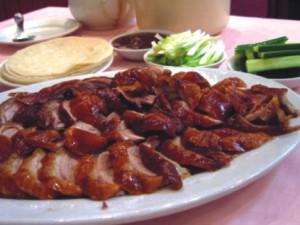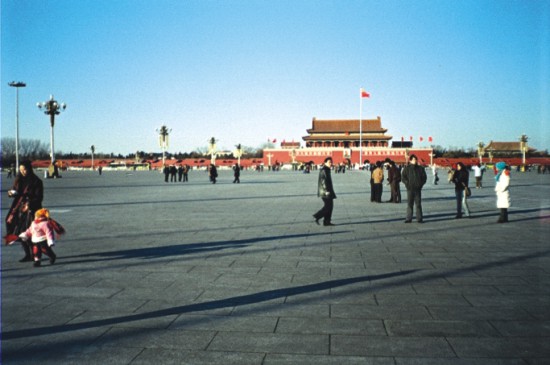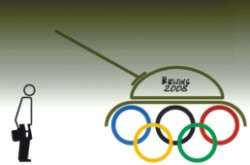|
Travel
Package Tours
‘Broken English and Peking Duck
Nader Rahman
This year China went through its worst winter in more than a hundred years and that is not the most encouraging news to someone travelling there in time to catch the tail end of an extremely cold spell. A little fazed yet undaunted I made my way to the capital of the world's leading economic powerhouse in early spring and came back with a better understanding of China along with an insight into what makes it tick. While ostensibly the reason for my visit was to attend a conference, it would be silly to say that was the only reason. Having been there before I wanted another taste of Beijing, its people and the Olympics.
Beijing is an immense sprawling city where short distances are those, which take under an hour to get to. The scale and grandeur of the city must be seen to be believed, from gigantic shopping centers to mountains of steel and glass in the business districts. But unlike many other mega cities that never sleep, there is a distinct cut-off period for Beijing. Past 12 midnight there is not much movement and while there are a host of all-night activities they seem miniscule compared to the daytime flow of cars and people, a New York it isn't but its nighttime still has a quirky charming quality. There are many cafés and all night eateries that are packed to the rafters with students doing everything from studying to playing cards to simply sleeping anywhere but their dorms. With what seems an urban Chinese penchant for crazy hairdos one gets a slightly surreal feeling walking into an all-night place full of people with crazy hair, sleepy eyes and speaking an incomprehensible language.

Peking duck
Aside from the student-infested university areas there are also numerous clubs and bars which are frequented by a cross-section of people. Having been to a few nightclubs it is easy to see the immense wealth of those who have 'capitalised' on China's love affair with the US Dollar. The parking lots of such clubs are lined with the most expensive and ludicrous cars that one could imagine, from the garden-variety Mercedes convertibles to quarter million dollar Ferraris, the cars are just one sign of the direction China is heading. Inside the same clubs, the hottest hits from halfway across the world play to a crowd of people who usually have no idea about the music but know that listening to it is status symbol in itself, a sign that they are in tune with what's cool around the world. Incredibly large amounts of cash are thrown about over drinks and to be seen is the name of the game. Such encounters strike one as fake and contrived from their ghetto wannabe clothes to their designer accessories, but then again, what better way to showcase the new side of Chinese capitalism hidden behind an hotchpotch communist party.
Nightlife aside there is another side of Beijing that one will find tough to get away from and that is the dreaded 'package tour'. Beijing happens to be dotted with UNESCO world heritage sites a plenty as well as the awe-inspiring Great Wall, thereby making it a prime tourist trap. One can barely walk a few hundred feet without being asked out to a private tour with an English-speaking guide all for a small fee of course. While many are scams and I am sure there are great tours to be arranged it is best to explore oneself and figure out how to go about the city and its sites of historical importance. From the Summer Palace to the Temple of Heaven there is a lot to see, but for me personally nothing outshines Tiananmen Square. The largest public square in the world dominates the city of Beijing like no skyscraper could do. Most people remember it as the place where pro-democracy protests were violently stamped out almost two decades ago. Few can forget the unnamed man with his grocery bags standing in front of a row of tanks, willing to give his life for the cause of democracy. That image alone is what draws people to the sight. Sure there is the lure of the Forbidden City to the north of the square but in my opinion the political and cultural significance of the square is what really draws the people. They mill around trying to the find the exact spot where he stood, trying to recreate a little piece of history in their heads. While Tiananmen Square was empty the last time I went to see it, this year was a different story. The place of protest 20 years ago was centre stage yet again as there were extraordinary numbers of police patrolling the area in the wake of the Tibet incident.
Only after seeing the security was it possible to realise that something was actually going on in China of political importance. The day after I landed in China there were bloody battles in the streets of Lasha in Tibet but only a good five days after the skirmishes did I come to know that something was up. Here is where the communist party of China really earns its keep, it was news which made world headlines but within China the event was suppressed to such an extent that most papers did not even cover the story and the news channels kept mum on the topic. It is truly amazing that probably no more than a million people out of a population of a billion even knew clashes were taking place within their own country. The press is controlled with an iron fist and most of the population was oblivious to the problem until it was finally dealt with a good week after the incidents occurred. There was a point when I could not access youtube and I did not know why until I came back home and found out it had been banned in China, along with CNN and other channels which reported on the violence in Tibet. The repressive Chinese regime seems great at raking in the dollars and controlling almost every other aspect of its citizens' lives. After hearing about the demonstrations in Tibet and the general unrest in the region I found the subsequent media black out appalling and to be completely honest it all felt like a page out of 1984.

Tiananmen Square
The unrest in Tibet has many other implications but none greater than jeopardising the Olympics which are to start in just over three months. Beijing like any Olympic city is completely geared towards the summer games and every other sign and item in a shop is Olympic branded. From the obvious t-shirts and toys to bread and even mobile phone accessories everything has an Olympic touch to it. The people I talked to were excited to be hosting the games but most claimed that while they would love the spectacle the only thing on their mind was for the games to off without a problem. It was a thoroughly practical way to look at the staging of the Olympic games, but it felt a little devoid of feeling and emotion. The real concern was to hold it and hold it well, there was no real emphasis on having a good time. I could be wrong in my interpretation but that was how I perceived the general atmosphere surrounding the games. The recent Tibet incident also puts more pressure on the Chinese government and to fix their human rights problems as that was one of the corner stones for awarding the games to Beijing.
Olympics aside there is still a lot to do and see in Beijing; the only problem is the language barrier. I have been told in France people refuse to talk to foreigners in anything but French even if they know English. I am sure it is a gross over-exaggeration but I understand the point, they value their language much the same we do ours and feel when in France do as the French do. But in Beijing and China for that matter people don't purposely speak in Chinese in an effort to hold on to their culture but just that the English is spoken by a tiny minority in the country and that makes even everyday things tough to do. From buying a loaf of bread to taking the subway the language barrier stands tall and wide and at times leads to comical situations. When trying to find out if a sandwich was pork or not I had to literally snort like a pig and do my best pig impression and then point to the sandwich, in an effort to see if someone could tell me. I usually get tittering laughter and more often than not the question is not answered. It is both annoying and fun at the same time. The worst problems come about when trying to take a cab, I phonetically learned how to pronounce a word and then had the driver staring blankly at me. If you want to move around you have two options, learn some pidgin Chinese or have everything written down in Chinese. If you choose to do none of the above get ready for everything and anything to be lost in translation.
 There is a stupid joke that in China, Chinese food is simply called food. Stupid it may be but believe me what we in the subcontinent know to be Chinese food is anything but food. I am one who likes to try out different kinds of food and China seems a great place to continue that habit, but things were not as easy as that. The average meal a Chinese person will have is not as appealing as the Dhaka-style Chinese we are used to. There is always a strange smell around the food and at least to me everything seems devoid of real taste. I must apologise for the over-generalisations, but most of the food I came across was not as appetising as I was hoping. But not withstanding I did have a few very good meals, the trick about eating there is either look at the pictures on the menu and order or just get a local to come along, they know what's best to have where. A small tip, they usually order a dish for everyone at the table and while that may not seem like a lot it all adds up when there is a large group eating. One usually ends up with more food than can be consumed. Another tip is at the end of the meal don't ask for a doggy bag. In China it is a sign on prosperity and good luck to leave what is uneaten behind, so no late night snacks. The best thing to have in Beijing is its namesake fowl dish, Peking Duck. It is usually not a cheap meal but is truly worth every cent paid for it. From the succulent thinly sliced flesh to the deep roasted bones to the Soup, it is a meal by its self. There is a stupid joke that in China, Chinese food is simply called food. Stupid it may be but believe me what we in the subcontinent know to be Chinese food is anything but food. I am one who likes to try out different kinds of food and China seems a great place to continue that habit, but things were not as easy as that. The average meal a Chinese person will have is not as appealing as the Dhaka-style Chinese we are used to. There is always a strange smell around the food and at least to me everything seems devoid of real taste. I must apologise for the over-generalisations, but most of the food I came across was not as appetising as I was hoping. But not withstanding I did have a few very good meals, the trick about eating there is either look at the pictures on the menu and order or just get a local to come along, they know what's best to have where. A small tip, they usually order a dish for everyone at the table and while that may not seem like a lot it all adds up when there is a large group eating. One usually ends up with more food than can be consumed. Another tip is at the end of the meal don't ask for a doggy bag. In China it is a sign on prosperity and good luck to leave what is uneaten behind, so no late night snacks. The best thing to have in Beijing is its namesake fowl dish, Peking Duck. It is usually not a cheap meal but is truly worth every cent paid for it. From the succulent thinly sliced flesh to the deep roasted bones to the Soup, it is a meal by its self.
Last but not least my final observation about the Chinese is their outstanding hospitality and unrivalled friendliness. I cannot explain how many strangers I went up to, to ask if they speak English and if they could help me out. Every single person helped as much as they could with their broken English and endless smiles. They are some of the nicest people I have ever met and it is easy to see how and why they have moved up in the pecking order of things. Single-minded, hard-working and friendly, what more could people want? Well, maybe a little English would not hurt. Copyright
(R) thedailystar.net 2007 |
